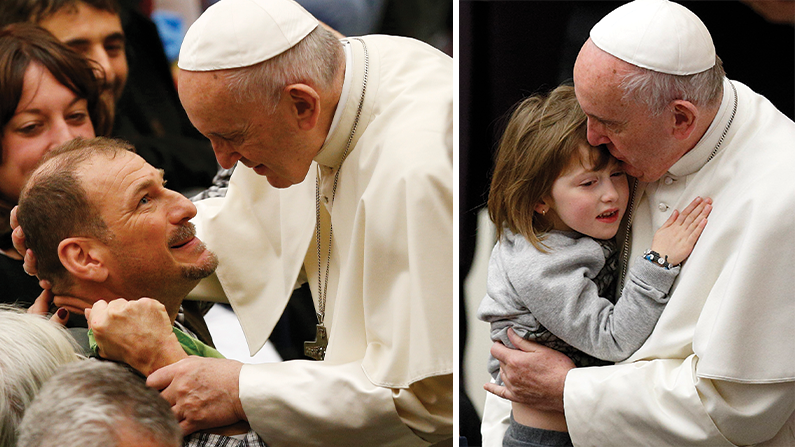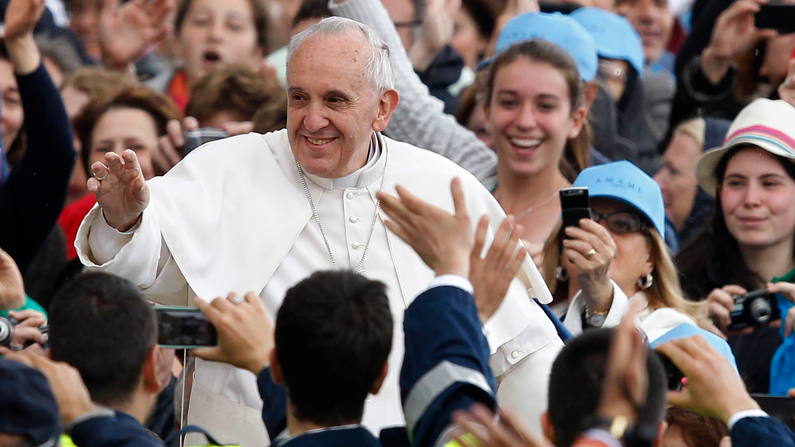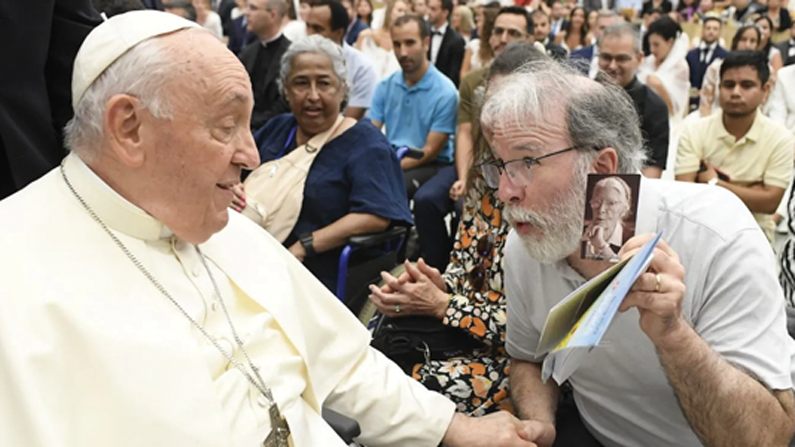Pope Francis’ legacy of missionary discipleship will live on, writes the publisher of Maryknoll’s Orbis Books.
Although he was both the first pope from Latin America and the first Jesuit, perhaps the most significant “first” of Pope Francis was his choice of name. No previous pope had taken the name Francis. The choice was deliberate, thus honoring the saint who set out to reform and renew the Church by recalling the image of its founder. As the pope noted, “I thought of Francis of Assisi … the man of poverty, peace, who lives and takes care of creation, a man who gives out a sense of peace, a poor man. Oh! How I would like a Church that was poor and for the poor.”
What’s in a name? The first signs came in a series of humble gestures: his choice to dispense with fancy garments and the custom-made red shoes and, more notably, his decision to forego the papal palace in favor of a modest apartment in the Vatican guesthouse. But beyond such gestures, it became clear that the model of St. Francis pointed to something more.
In the conclave leading up to his election in 2013, then-Cardinal Jorge Bergoglio had delivered a short speech outlining his vision for the Church and its mission. The greatest threat to the Church, he said, came from ecclesial introversion and “spiritual worldliness.” In contrast, he called for an evangelizing Church, that “comes out of itself” to go to the margins and peripheries — both geographical and existential.
Pope Francis, who as a young Jesuit had dreamed of becoming a missionary, defined mission as the very reason and being of the Church. “I dream of a ‘missionary option,’ that is, a missionary impulse capable of transforming everything.” All renewal, he said, should be “channeled for the evangelization of today’s world rather than self-preservation.” He preferred “a Church which is bruised, hurting, and dirty because it has been out on the streets rather than a Church which is unhealthy from being confined and from clinging to its own security.”

Left, right: Pope Francis welcomes a disabled man at his general audience in 2018; Pope Francis embraces a child while meeting the disabled at his general audience in 2016. In his encyclical Fratelli Tutti, he wrote, “Many persons with disabilities feel that they exist without belonging and without participating.” (CNS/Paul Haring/Vatican City)
Pope Francis’ first excursion out of Rome was to the island of Lampedusa, a way station for migrants and refugees in the Mediterranean, where many of them drowned at sea. In his Mass there, he said that the plight of these migrants challenged us with God’s words to Cain: “Where is your brother?” They revealed to us the dangers of a “culture of indifference” that makes it impossible for us to recognize our brothers and sisters — much less the face of Christ — in the poor and those who suffer.
This concern for migrants and refugees would become a signature theme in his preaching and ministry, connected closely to his insistence on a preferential option the poor. Without this, “proclamation of the Gospel risks being misunderstood or submerged by the ocean of words.”
A second major theme, inspired by St. Francis, was his concern for the earth, our “common home.” In Laudato Si’ he set this concern squarely at the center of Catholic social teaching. “Everything is connected, everything is related,” he proclaimed in a call for “ecological conversion.” Ten years later he followed up on this encyclical with a second document decrying the lack of meaningful progress in responding to this challenge.

Pope Francis greets cheering crowds at St. Peter’s Square in 2013, the year he was elected. Formerly known as Jorge Mario Bergoglio, the Jesuit served previously as archbishop of Buenos Aires, Argentina. (CNS/Paul Haring/Vatican City)
Pope Francis’ overseas pilgrimages, always bearing a message of peace, took him to places far from the beaten papal track: Kazakhstan, Iraq, Mongolia, South Sudan, Azerbaijan and Myanmar. During his one pilgrimage to the United States, he spoke before a joint session of Congress in a speech centered on the dreams of four “great Americans”: Abraham Lincoln, Martin Luther King Jr., Thomas Merton and Dorothy Day. Calling America a country of dreams, he said that a nation is made “great” by attending to the dreams of such figures for freedom, justice, care for immigrants and the pursuit of peace. Among other topics, he spoke against the death penalty, said that care for the common good includes care for the earth, referred to his own status as the child of immigrants, and decried the “blood-soaked arms industry.”
But Pope Francis’ mission was not defined by what he was against. Constantly he called the world to a new culture of encounter and “fraternity,” the subject of his encyclical, Fratelli Tutti. He also had a distinctive vision for the Church. One of his great projects was to set in motion a “synodal” way of being church. Synodality, he noted, means “walking together.” Rather than the periodic synods of bishops in Rome, generally followed by predetermined conclusions, Pope Francis envisioned a decentralized and inclusive process of reflection and discernment, drawing on the participation and input of all the People of God. In convening an “Amazon Synod” he especially highlighted voices from the “margins and peripheries.”
Some objected to Pope Francis’ emphasis on mercy as the central language of the Church, in place of the enforcement of rules and traditions. Others felt he did not move quickly enough and wished he would settle longstanding controversies with clear declarations.

Pope Francis smiles as he recognizes a photo of Servant of God Dorothy Day depicted on a prayer card held by Robert Ellsberg, publisher of Maryknoll’s Orbis Books. (Courtesy of Robert Ellsberg/Vatican City)
But that was not Francis’ way. One of his maxims was “Time is more powerful than space.” He believed the important thing was to plant seeds and set initiatives in process. Their fruit would only reveal itself in time. Thus, the measure of his papacy was not so much in new teachings but in a new style, a new culture, a pastoral strategy that emphasized listening and collaboration rather than authoritative edicts.
Pope Francis’ teaching came as much through gestures as in written documents: his spontaneity and spirit of joy, his ability to connect with people of all sorts, and especially his compassion for the poor and all who suffer. In his first year as pope, he initiated a tradition of visiting men and women prisoners on Holy Thursday. He repeated that custom every year, even in the last week of his life, although that time his health did not permit him to wash their feet.
No doubt Pope Francis, who called for the Church to become a “community of missionary disciples,” was a sign of hope and inspiration for all the Maryknoll family. For Orbis Books, where we published more than 20 volumes of his writings, he offered a standard that we tried to follow and serve. Thus, it was deeply affirming in 2020 to receive a personal letter from him marking our 50th anniversary. Lauding our effort to publish books that offer “a true horizon of meaning,” he spoke of the importance of “cultivating — especially in the younger generations — an imagination that would help them believe that another way of writing history is possible.”
Of himself, he wrote in his apostolic exhortation The Joy of the Gospel: “My mission of being in the heart of the people is not just a part of my life or a badge I can take off; it is not an ‘extra’ or just another moment in life. Instead, it is something I cannot uproot from my being without destroying my very self. I am a mission on this earth; that is the reason why I am here in this world.”
He inspired us all to find and to be our own mission on this earth, and to live that mission with equal boldness, courage and love.
Editors’ note: For an interview with the author of this article, who edited about a book compiling Pope Francis’ homilies and writings, A Stranger and You Welcomed Me: A Call to Mercy and Solidarity with Migrants and Refugees, click here.
Featured image: Pope Francis greets crowds outside the Basilica of St. John Lateran, where he celebrated Mass on April 7, 2013, less than a month after his March 13 election. Having shepherded the Church for the 12 years of his papacy, Pope Francis died on April 21, 2025, Easter Monday. (CNS/Paul Haring/Rome)

